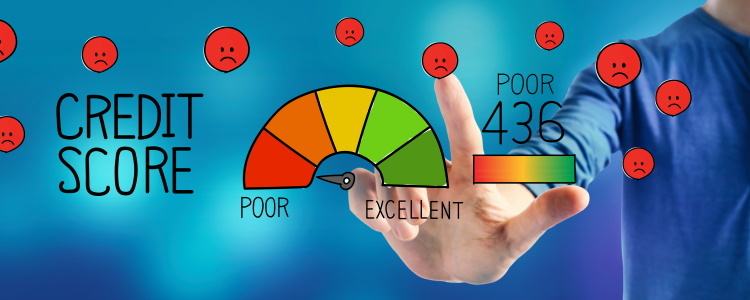Financing a car with bad credit comes with more requirements and rules than getting an auto loan with good credit. Because of all the preparation you need to do, it can seem overwhelming – but it doesn't have to be. There's a lot to consider before you dive into the financing process, and we want to help make sure your bases are covered.
Before Heading to a Dealership
The car buying process starts long before you head to the dealership to finance a vehicle. The first steps to any car buying journey begin at home with research and preparation.
This is where you can really judge your situation, and choose how to proceed to get the financing you need for your credit situation. Remember, never let anyone determine your credit situation for you. As the saying goes, knowledge is power.
Know Your Credit Situation
The first step in any bad credit car buying situation is to know what your credit score is and what's on your credit reports. If you don't know these things, then you won't know if you even need a bad credit auto loan.
You also can't research average interest rates for people in similar credit situations – or get an accurate estimate from online tools and calculators – if you don't know where your credit stands. Without doing this, you're giving the lender the upper hand.
Most lenders today use your FICO credit score when they're evaluating your loan application. You can often get yours for free through your bank, credit union, or credit card company. If you don't have access through any of these sources, you can pay a small fee to get your score directly from www.myFICO.com or the credit bureaus.
Your credit reports are a little easier to come by, as you're allowed a free copy from each of the national credit bureaus – TransUnion, Equifax, and Experian – once every 12 months. You can request them by visiting www.annualcreditreport.com.
Determine Your Budget
It's important to balance a car payment with the other things in your life. Lenders want you to choose a vehicle that you can comfortably afford. With that in mind, it's important to make sure you calculate a budget, determine how much you can finance, and don't allow anyone to sell you more car than you can afford.
This can be tough, especially since it's always nice to imagine yourself in the latest and greatest new vehicle. However, if you have to stretch out a loan term to seven, eight, or even nine years to handle a monthly payment, you should reconsider.
You can better determine how much you can afford to spend on a car by calculating your debt to income (DTI) and payment to income (PTI) ratios. These calculations tell you how much of your income is available to use for an auto loan.
The DTI ratio lets you know how much of your income is needed for your bills, while the PTI ratio lets you know the percentage of your income you're spending on just the car payment. Learn more about your DTI and PTI ratios here.
Remember, lender's don't want you to struggle to pay your auto loan. They generally aren't going to approve you if more than 45% to 50% of your income is already being used for your existing bills. Also, the lower your PTI is, the better; lenders typically don't allow your payment to exceed 15% to 20% of your pre-tax monthly income.
Research Your Vehicle Options
Just because your credit isn't stellar doesn't mean you're limited to used clunkers from the local buy here pay here dealer. If you do your homework and research your vehicle options, you may find that there's a lot more room in your budget than you think.
Even though it's important to check out the cars you're interested in, it's also important to understand that bad credit borrowers can't just walk into a dealership and pick out any vehicle on the lot. The reason you can't is because of how the bad credit car loan process works.
When you have poor credit, you probably need to work with a subprime lender. These are indirect lenders that only offer loans through special finance dealers and specialize in lending to credit-challenged consumers.
If you're approved for financing, the lender informs the dealership which tier you qualify for; this determines your interest rate and maximum loan term. The dealer then lets you know which vehicles on their lot you qualify for and can choose from.
So, what's the point of researching cars if you have to wait to see what you qualify for? There's a lot more involved in research than just picking out a vehicle you want to own.
You have to ask yourself why you want a particular car, and if it meets your needs. You can research affordable new and used vehicles, focusing on makes and models that fit your daily life – crossovers and SUVs if you have to carpool kids around town every day, or fuel-efficient sedans if you have a long daily commute.
Don't forget to check the safety ratings and read consumer reviews of the vehicles you’re considering. It's also smart to make a list of must-haves and must-nots. This way, you're prepared to let the dealership know what you're looking for. When you know which options are out there, it's much easier to make a choice from the selection you're presented with.
Prepare to Visit the Dealership
You already know that you're more likely to have success getting approved for an auto loan if you go to a subprime lender, but do you know why? The reason these lenders can help borrowers with bad credit is because they look beyond your credit score to other factors to qualify applicants.
These factors, such as income, employment and residence stability, and a willingness to invest in your own success, require more than your word, though. Lenders require documentation to prove that what you put on your credit application is true; not because they don't trust you, but because they can't predict how likely you are to repay your loan based on your past credit.
Lender requirements can vary, but you typically need to provide the following:
- Proof of income – A computer-generated paycheck stub showing year-to-date income of $1,500 to $2,000 before taxes from a single source.
- Proof of residence – A current utility bill in your name at the address listed on your car loan application.
- Proof of a working telephone – Must be in your name, and can be either a landline or contract cell phone. Prepaid phones don't count.
- List of personal references – Provide a list of five to eight personal references complete with full names, addresses, and both home and work phone numbers.
- A valid driver's license – This provides proof of identity, as well as proves that you can legally drive a car.
A Few Last Considerations
There are just a few more things to keep in mind before you begin your car buying journey. Remember that there's more to the cost of a vehicle budget than just the selling price.
Cars need fuel, regular maintenance, occasional repair, and insurance. When you're financing a vehicle, you're required to carry full coverage insurance, which may cost more than a minimum plan you’re allowed to carry when you own a car outright.
You should also know that because requirements vary by lender, some of them may have additional requirements for you, such as asking for a cosigner on your loan. A cosigner signs the loan alongside a primary borrower, which makes them legally obligated to pay it back. They serve as a backup in case you can't make a payment.
Finally, it’s important to understand that an auto loan can be a great tool to improve your credit score, but only if make your payments on time.
Where to Go for an Auto Loan in Your Area
Now that you're ready for the bad credit car buying process, it's time to find a dealer that has the right kind of lenders to work with. Luckily for you, Auto Credit Express can help you do just that.
We work with a nationwide network of special finance dealerships that have the lenders you need. By filling out our free auto loan request form, you can get the process of getting matched to a dealer near you started. Don't wait any longer, click here to get started today!
















